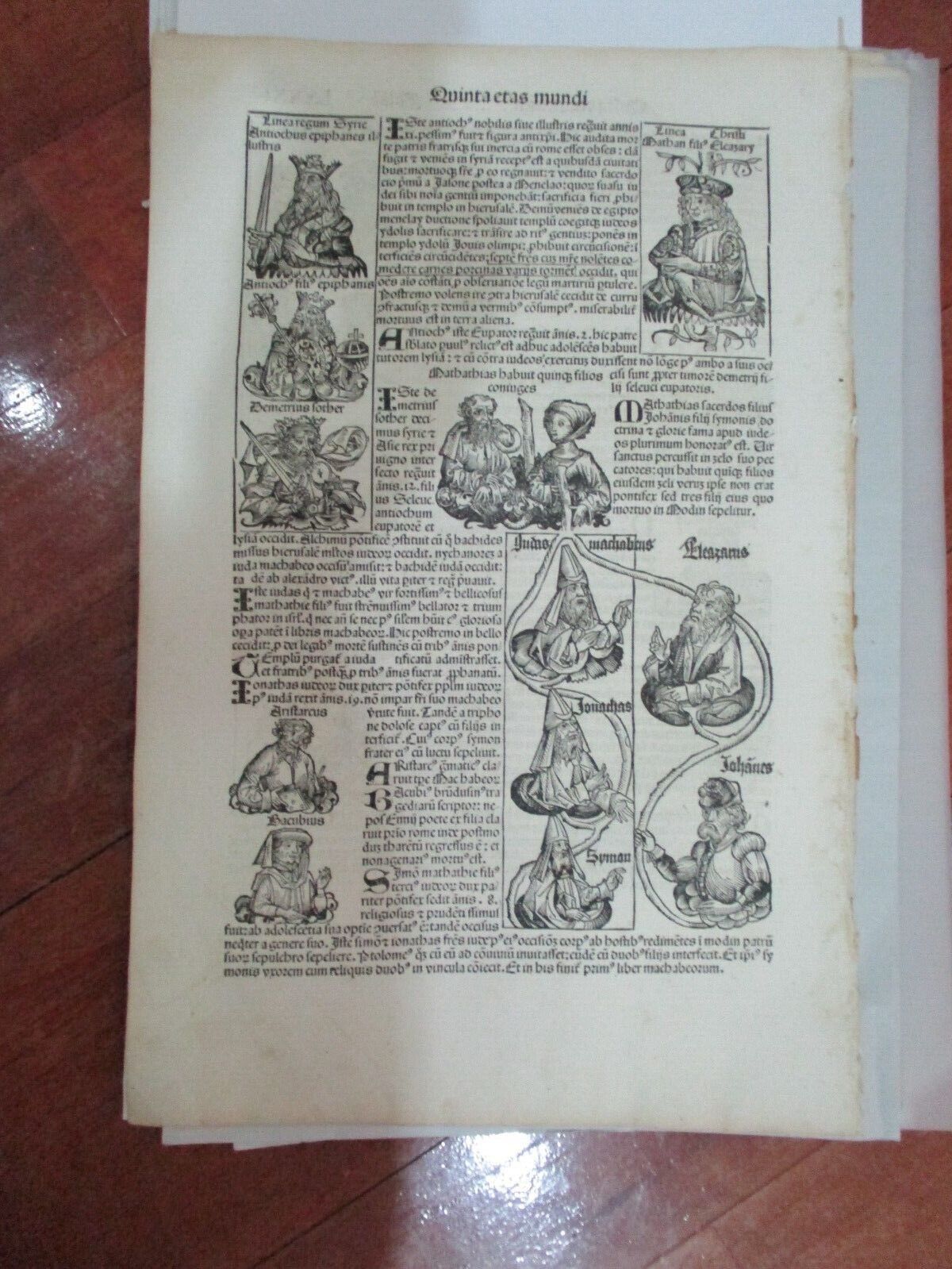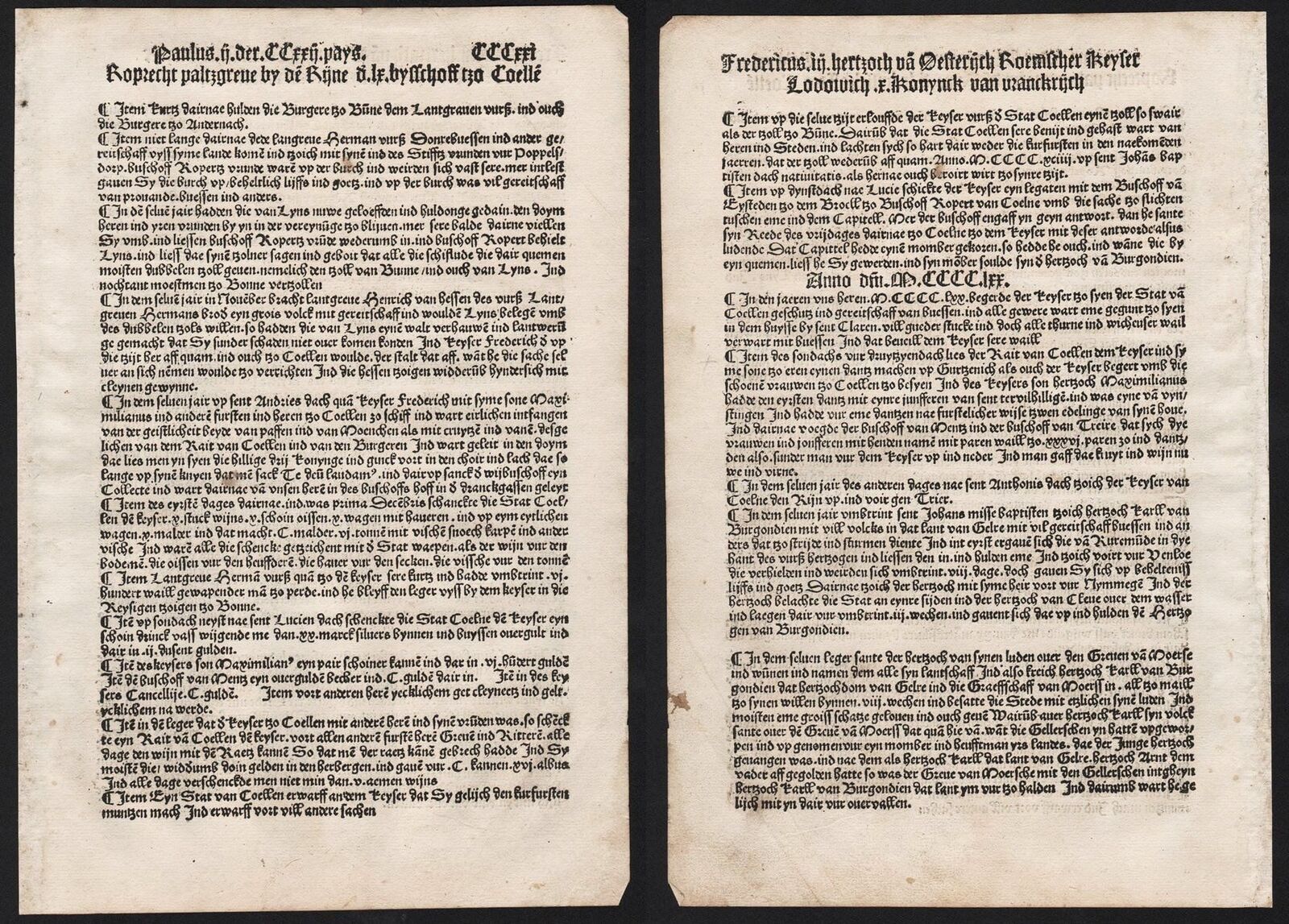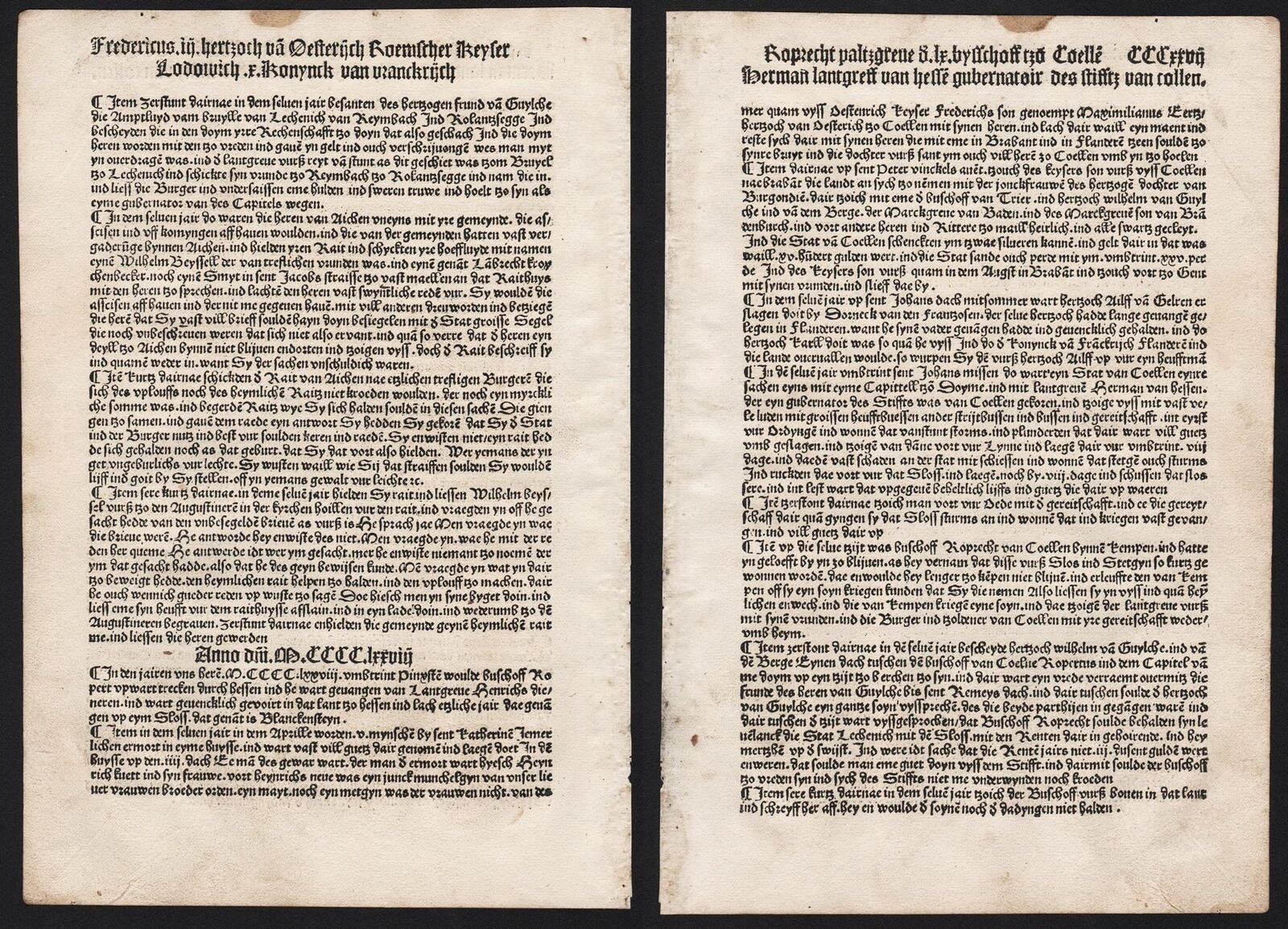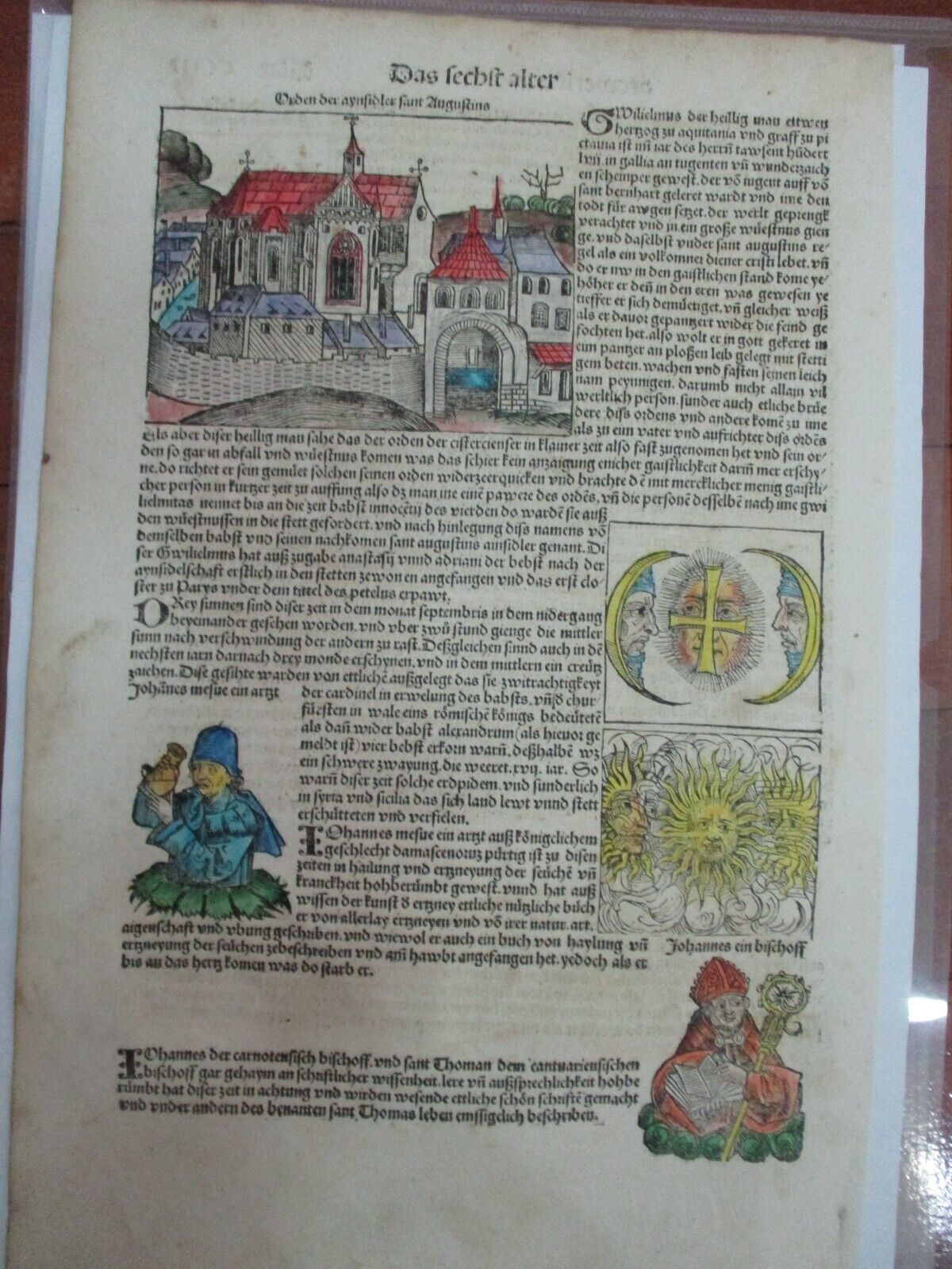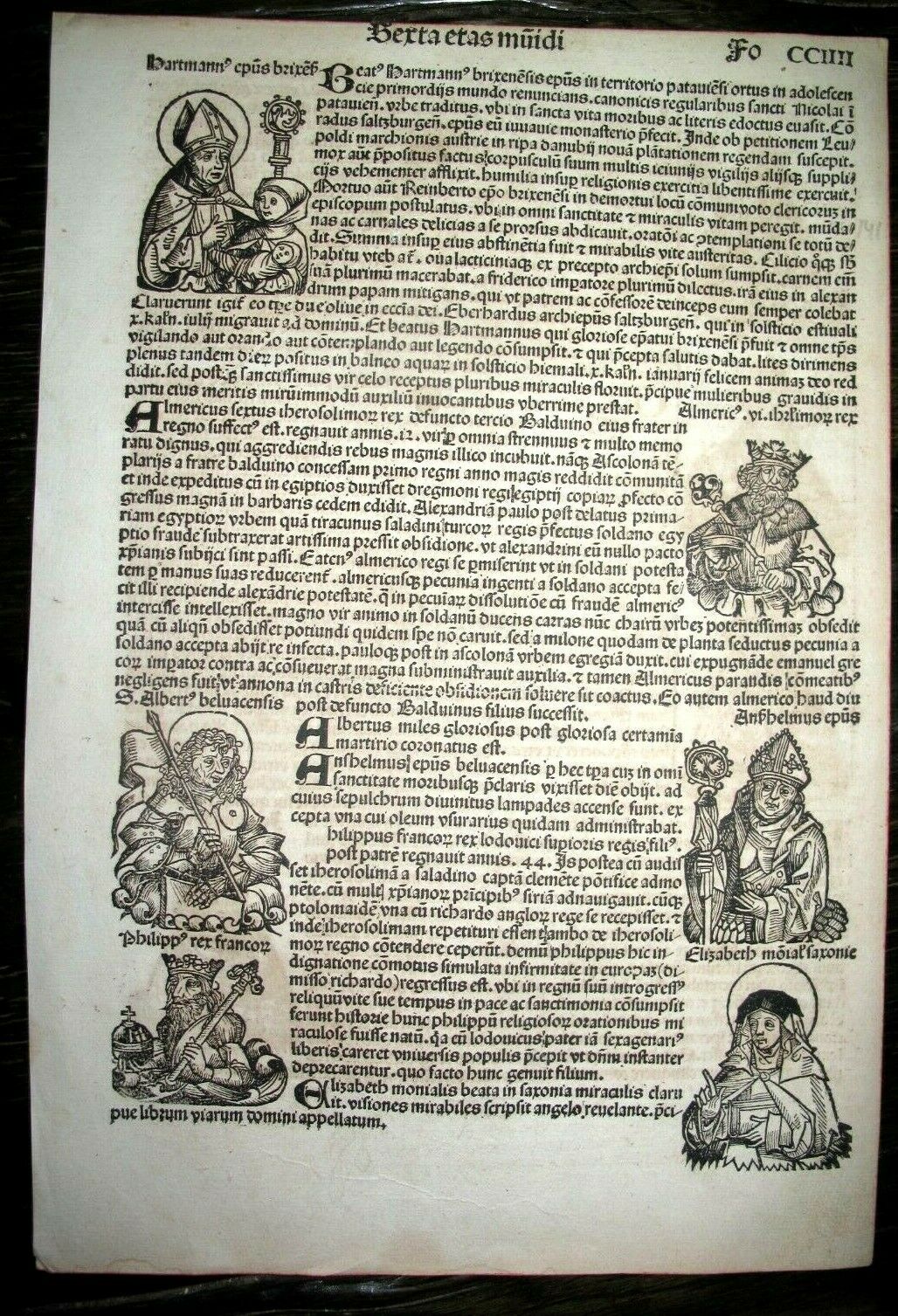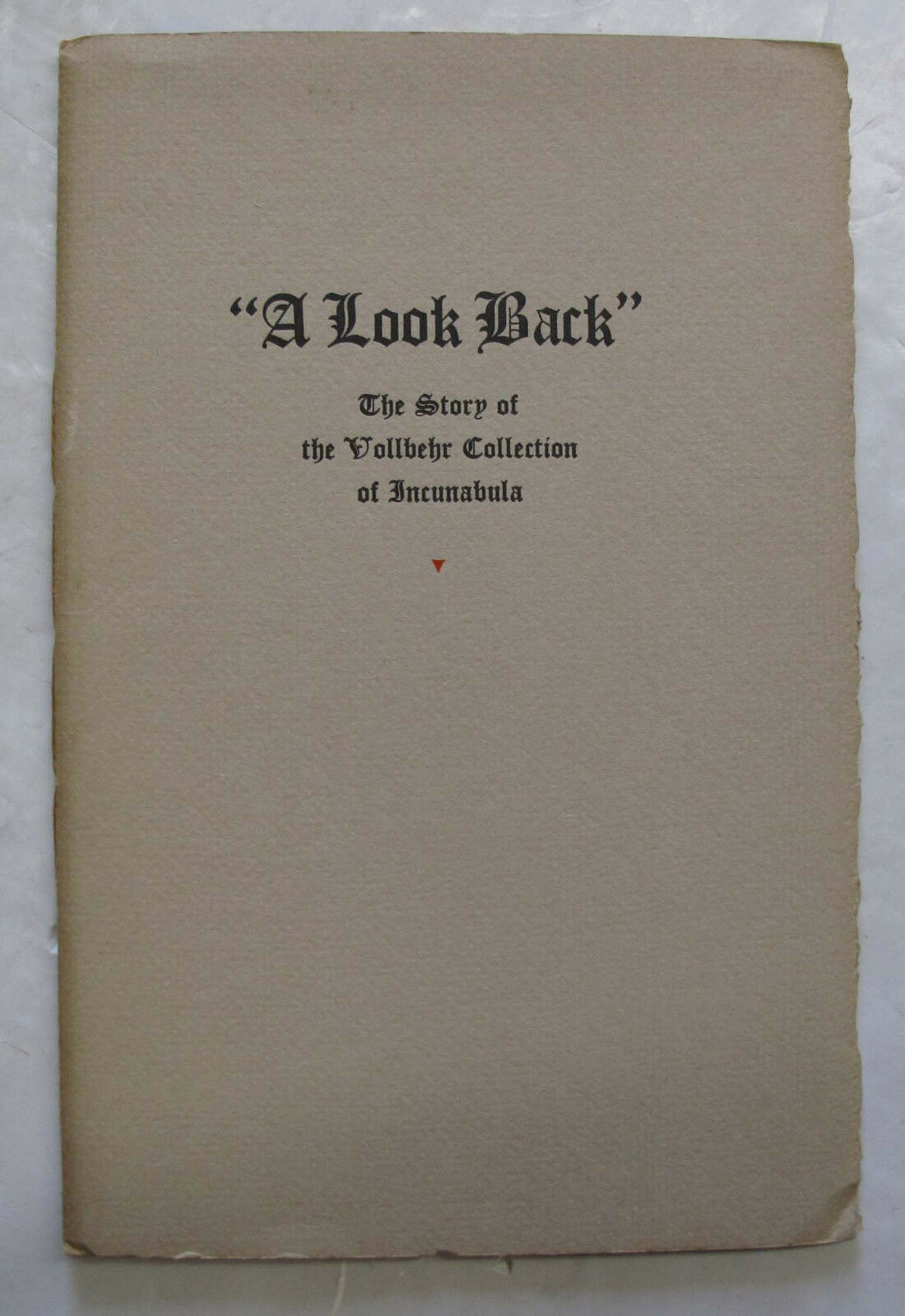-40%
Page 81 of Incunable Nuremberg chronicles , done in 1493 . LATIN
$ 137.28
- Description
- Size Guide
Description
This is the page 81 from the famous book the chronichles of nuremberg , so far so on the history of the world as they sawuntil 1493. This one is part of the harder ones to get (with the maps, cities and early history)
FOLIO LXXXI recto
In the 477th year of the founding of the city of Rome[The 477th year of the founding of the city corresponds to 277 BCE.], the name of the city was highly renowned; but its arms had not been carried beyond Italy. Rome then had a population of 292,334 inhabitants. And although the Romans from the beginning of their city had never been at war, they now entered upon a conflict with the Africans[Both in the German and the Latin editions of the the Carthaginians are referred to in this manner.], firstly, under Appius Claudius and Quintus Fabius, the consuls, in Sicily. And Appius Claudius triumphed over the Africans and king Hieron of Sicily.[This introduces the first of the Punic Wars, which raged between Rome and Carthage in the 3rd and 2nd centuries BCE. The conflict began during the consulship of Appius Claudius and Quintus Fabius, who conducted the war against the Carthaginians in Sicily. Incidentally, it must be noted that the lineage of the Roman consuls, as given in the , is by no means complete. These officials were elected annually, two for each year, and their number is legion, as can be readily appreciated by consulting the table supplementing Arnold's , William Smith's , and works of a like nature. The consuls and dictators who appear in the are only a very small number selected by Schedel.]
Under these consuls the Punic War against Hannibal the elder began.[This sentence does not appear in the German edition of the .]
During the consulship of Gnaeus (Gneo) and Caius (Gayo) the Romans fought at sea with sharp-pointed ships. Cornelius (the Gnaeus mentioned above) was betrayed, but Duilius (the Caius mentioned above) defeated the Carthaginian commander, captured 31 ships, and sank 14; he took 7,000 prisoners, and slew 3,000 of the enemy. The Romans had never enjoyed a more satisfying victory because although they had been undefeated on land, now they were also very powerful on sea.
Cn. Cornelius Scipio Asina (here called Gnaeus), and Caius Duilius were consuls in 260 BCE, and participated in the first Punic War. The author's reference to a naval battle with "sharp-pointed ships," may be thus explained: The old method of attempting to sink or disable an enemy ship by piercing her just below the water, with a brazen beak affixed to every ship's bow, was still universally practiced during their time. The system of fighting, therefore, brought the ships close together; and if the fighting men on one side were superior, boarding, if possible, assured victory. This was therefore the Roman goal, and for the purpose they contrived a sort of drawbridge thirty-six feet long and four wide, with a low parapet on each side. This bridge was attached by a hole at the end of it to a mast twenty-four feet high, erected on the ship's prow; and the hole was large and oblong, so that the bridge not only played freely all round the mast, but could be drawn up so as to lie close and almost parallel to it. The end of the bridge was hoisted by a rope passing through a block at the masthead. The bridge was let fall on the enemy's ship at whatever quarter she appeared; and as a ship's beak was commonly her only weapon, an enemy ventured without fear close to her broadside or her stern, as if she were there defenseless. When the bridge fell a strong iron spike, fixed at the bottom of it, was driven home by the mere weight of the fall into the deck of the enemy's ship, and held it fast; whereupon the soldiers in two files rushed over the bridge and boarded the enemy vessel. And thus equipped the Roman fleet put to sea. It was commanded by one of the consuls, Cn. Cornelius Scipio; but as he allowed himself to be taken with seventeen ships in an ill-advised attempt on the Liparaean Islands, his colleague Duilius was called upon to conduct the fleet. He came upon the Carthaginians under the command of Hannibal; and they advanced confident of victory. But the 30 ships that formed the Carthaginian advanced squadron, including that of Hannibal himself, were immediately grappled by the Roman bridges, boarded and taken. Hannibal escaped in his boat to the main line of battle; but the character of the reception received by their first division startled the Carthaginians; and when they found their approach endangered by these bridges from every angle, they were seized with a panic and fled. Their total loss is said to have amounted to about 50 ships, 3,000 slain, and 7,000 prisoners. Some authors speak of "grappling irons, by means of which the enemy's ship might be drawn, and the sea fight thus changed into a land fight;" but the bridges are probably meant.
The phrase "because although they had been undefeated on land, now they were also very powerful on sea" is not in the German edition of the Chronicle.
Crispus[There is no stoic philosopher called Crispus. The chronicler, or his source, must mean Chrysippus (c. 280–c. 207 BCE), the so-called second founder of Stoicism after Zeno.], a Stoic[Stoicism is a school of Hellenistic philosophy founded in Athens by Zeno of Citium in the early third century BCE. It was incredibly influential throughout all of antiquity.] philosopher, who was from the nation of Elea[Chrysippus was not from Elea (
Velia
in Latin and Italian), a town in southern Italy, but from Soli (in Cilicia, Asia Minor), and was raised in Tarsus (also in Asia Minor). The pre-Socratic philosopher Zeno, who lived in the fifth-century BCE (and who is not the founder of Stoicism) was from Elea. Perhaps the fact that the two philosophers were called Zeno, and that Chrysippus was considered with the second Zeno to be the founder of Stoicism, is what caused the confusion. In any case, the German edition of the does not include the phrase "who was from the nation of Elea."], flourished at this time. At the age of eighty he wrote a book so subtle that a long life is required to understand it, so Valerius gives witness in his 8th book.[] From his rather angry sayings the following one is very famous: The wise man is in need of nothing, yet is deserving of many things; the fool, on the contrary, is deserving of nothing, and, not knowing how to make use of anything, he lacks all things.[Seneca cites this quote of Chrysippus (to whom he ascribes it) in (‘Moral Epistles') 9.14] Zeno[Zeno (334-262 BCE) was a Greek philosopher from Citium, Cyprus, and the founder of the Stoic school of philosophy that he taught in Athens from around 300 BCE. Stoicism, which took its name from the fact that Zeno used to teach in the (‘Painted Porticoe') of Athens, along with the ideas of Plato's Academy, Epicureanism, and the philosophy of the Cynics, was one of the four great philosophical schools of thought of the ancient world. Its general principals placed great emphasis on the goodness and peace of mind that would arise from living a life of virtue in accordance with nature. After Zeno's death it quickly became the most popular philosophical way of life in the Hellenistic and Roman worlds.], also a philospher at this time, said, What is said in your sole presence should be buried with you. These two were authors of the Stoic sect.[This last sentence is not in the German edition of the .]
These two consuls (referring to the portraits of Lucius Scipio and C. Florus Aquillius) fought with Hanno, the Carthaginian commander; and they devastated Corsica and Sardinia, and Scipio took away many thousands of people as prisoners and celebrated a triumph.[Lucius Cornelius Scipio and C. Florus Aquillius were consuls in 259 BCE, the 6th year of the first Punic War. Scipio drove the Carthaginians out of Sardinia and Corsica, defeating Hanno, the Carthaginian commander, and obtaining a triumph in consequence. The province assigned to Florus was Sicily, where he watched the movement of Hamilcar. Florus triumphed in 258.]
Polemon, an Athenian philosopher, was in repute at this time. As Laertius states, he was immodest and forward in his youth, and to satisfy his pleasures he carried his money about with him and hid it in obscure lanes and streets. Once while intoxicated and crowned, he stumbled into the school of Xenocrates, who stopped discoursing on the subject in hand, and commenced to lecture on modesty. In consequence Polemon bravely and diligently applied himself to such a degree that he became the successor of Xenocrates in the leadership of the school.[Polemon of Athens was an eminent Platonic philosopher. He was the son of Philostratus, a man of wealth and political distinction. In his youth, Polemon was extremely profligate; but one day, when at the age of thirty years, on bursting into the school of Xenocrates, at the head of a band of revelers, his attention was so arrested by a discourse on temperance, that he tore off his garland and remained an attentive listener. From that day he pursued an abstemious course of life, and continued to frequent the school, of which, on the death of Xenocrates in 315 BCE, he became the head. He died in 273 at a great age. He esteemed the object of philosophy to be to exercise men in things and deeds, not in dialectic speculation. His whole theory was to live according to the laws of nature.]
Under these consuls (referring to the portraits of M. Atilius Regulus and Lucius Manlius Vulso) many catastrophes by fire and water almost consumed the city of Rome; and there was war in Africa against Hamilcar, the Carthaginian general, and a battle was fought on the sea, in which he was defeated. Afterwards those consuls proceeded as far as Carthage, and they destroyed many cities. Manlius (Mallius) returned to Rome as a victor, while Atilius Regulus remained in Africa, making war against the Africans and fighting the three Carthaginian generals, namely the two Hasdrubals (Asdrubales) and Atailcar (Atailcarem)[Since there is no historical individual known as Atailcar, the chronicler must have meant Hamilcar.]. He vanquished them and slew 17,000 of the enemies. He also killed a marvelously large serpent, whose skin was 120 feet in length. It was shown to many as an object of wonder at Rome. Then the defeated Carthaginians sought peace from the Romans. But later Regulus was in turn defeated.[L. Manlius Vulso Longus and M. Atilius Regulus, consuls in 256 BCE, the 9th year of the first Punic War, defeated the Carthaginians by land and sea in Africa, and landed a large force there. They met with striking success; and after Manlius returned to Rome with half of the army, Regulus remained in Africa with the other half and vigorously prosecuted the war. He defeated the Carthaginian generals Hasdrubal, Bostar, and Hamilcar with great loss, and they retired within the walls of the city. Regulus ravaged the country round about. But in the midst of defeat success came to the Carthaginians from an unexpected source. Xanthippus, a Greek mercenary, pointed out to the Carthaginians their error, and being chosen to lead them, he boldly marched against the enemy in the open country with 4,000 cavalry and 100 elephants. Regulus was totally defeated, 30,000 of his men were slain, scarcely 2,000 escaped to Clypea, and Regulus himself was taken prisoner.]
During the consulship of Marcus Aemilius (Emilio) and Paulus Servius, both these Roman consuls sailed to Africa in three hundred ships by way of the city of Clipsea; and soon they came to Carthage. They first defeated the Africans in a naval battle. Aemilius sank one hundred and four ships with the enemy on board, and captured thirty ships and their warriors; in addition he either slew or took 15,000 prisoners, and Africa would have been totally defeated at this time if there had not been a famine, which prevented the army from remaining there any longer. But at Sicily the consuls suffered shipwreck.[Servius Fulvius Paetinus Nobilior and M. Aemilius Paullus, whom the chronicler calls Marcus Aemilius and Paulus Servius, were consuls in 255 BCE. The Romans equipped a large fleet during their consulship, which defeated the Carthaginians in a naval battle, and carried off from Africa the survivors of the army of Regulus; but on its return to Italy the fleet was shipwrecked and most of the vessels were destroyed.] At this time silver money was first coined at Rome.
FOLIO LXXXI verso
Antiochus, noble or illustrious, reigned 11 years. He was an image of the Antichrist. While he was a hostage at Rome he learned of his father's death and of the laziness of his own brother; and so he secretly fled and, coming to Syria, was there received by several cities. When his brother died he reigned in his place. After the sale of the priesthood, firstly by the advice of Jason and later by that of Menelaus, he ordered pagan names to be applied to the Jews and forbade sacrifices in the Temple at Jerusalem. After his return from Egypt he robbed the Temple at the instigation of Menelaus, and ordered the Jews to sacrifice to idolatrous gods and to adopt pagan customs. He placed an idol of Olympian Zeus (Jovis Olimpi) in the Temple, prohibited circumcision, and slew the circumcisers. The seven brothers and their mother, who would not eat pork, he martyred with various forms of punishment. Finally, when he was about to go to Jerusalem, he fell from a chariot, which broke; and he was consumed by worms, and died a miserable death in a strange land.[For Antiochus IV Epiphanes, see also Folio LXXX verso, and note.]
Antiochus Eupator reigned 2 years. He was still a child when his father died. Lysias was his guardian during his youth. They both led forth an army against the Jews, but before long were slain by their own people through fear of Demetrius, the son of Seleucus Eupator.[Antiochus V (Eupator), no doubt here referred to, was nine years old at the time of his father's death, and reigned under the guardianship of Lysias. He was dethroned and put to death by Demetrius Soter, the son of Seleucus Philopater, who had up until this point in time lived at Rome as a hostage.]
Demetrius Soter (Sother), the tenth king of Syria and Asia, reigned 12 years after the murder of his step-son. The son of Seleucus slew Antiochus Eupator and Lysias, and made Alcimus (Alchimum) a priest. He was sent to Jerusalem with Bacchides, and many Jews were slain. He sent Nicanor, who was killed by Judas Maccabeus. And he killed Bacchides the Judean. And, finally, he was conquered by Alexander, who deprived him of life and kingdom at the same time.[Demetrius Soter, who reigned 162-150 BCE, was the son of Seleucus IV (Philopator) and grandson of Antiochus the Great. While yet a child he had been sent by his father to Rome as a hostage, and remained there during the whole reign of Antiochus IV (Epiphanes). After the death of Antiochus, being now 23, he asked to be set at liberty, but being refused, he secretly fled from Rome and went to Syria. The Syrians declared in his favor; and the young king Antiochus V, with his tutor Lysias, was seized by his own guards and put to death. Rome recognized Demetrius as king; but having alienated his own subjects by luxury and intemperance, they sided with an imposter named Balas, who took the mane of Alexander. He defeated Demetrius in battle and slew him. Demetrius left two sons, Demetrius Nicator and Antiochus Sidetes.]
Mattathias, the priest, a son of Jonathan, the son of Simonides, was honored by the Jews for his learning and enjoyed glorious renown. In his wrath, this holy man slew the sinners; and he had five sons who possessed the same wrath. But he was not a priest, although three of his sons were. When he died he was buried at Modin.[Mattathias, a citizen of Modin, was of priestly descent. When in accordance with the policy of Antiochus IV, the royal officers attempted to establish pagan sacrifices in the town, Mattathias refused to conform, killed the officer and a Jew about to offer sacrifices, leveled the pagan altar to the ground, and fled with his five sons to the mountains. There he was joined by a number of other like-minded individuals. After a few months of vigorous fighting, Mattathias died, leaving the conduct of the revolt to his five sons. Of these Eleazar and John were killed in the succeeding struggle, without having attained official standing. The other three were his successors. (1 Maccabees 2)]
This Judas, the Maccabee, a very brave and war-like man, and a son of Mattathias, was a very stern warrior. He triumphed in Israel, and had no equal before or after that time. His glorious deeds are on display in the books of the Maccabees.[This sentence is not in the German edition of the .] He was finally defeated in battle. For the sake of the laws of God he suffered death, after having administered the priesthood for three years.[Judas, called Maccabee, or ‘the Hammer,' from which surname the entire family came to be known, was essentially a warrior, whose plans involved not only the re-establishment of the Torah, but also, in all probability, the reestablishment of the Jewish State in at least a semi-independent position. He defeated successively the Syrian generals Apollonius and Seron. Antiochus IV then sent Lysias, the imperial chancellor, to put down the revolt, and he in turn sent a large body of troops against Judas, under three generals—Ptolemy, Nicanor and Gorgias. Judas called the fighting men of Galilee together at Mizpah, organized them, and at Emmaus surprised and utterly defeated the forces of Gorgias. Later he defeated a great army under Lysias at Bethzur. In December 165, Judas cleansed the Temple of the Syrian pollutions, and inaugurated the re-established worship with a great feast. For a year and a half he waged war against his enemies on the east of the Jordan, while his brother Simon brought the scattered Jews throughout Galilee back to Judea for safety. His vigorous campaign seems to have alienated ‘The Pious,' who had seen their ambitions realized in the re-establishment of the Temple worship. Lysias returned with a great army, completely defeating Judas at Beth-zacharias. He then laid siege to Jerusalem, where the citadel was still in Syrian hands. Jerusalem surrendered but Lysias did not attempt to disestablish the Jewish faith. He appointed Alcimus as high priest, who was received by ‘the Pious' as legitimate, although he favored the Greeks. Judas and his party, however, remained in revolt, and when Lysias returned to Syria, undertook war against Alcimus himself. Demetrius I, who had succeeded Antiochus IV, sent Nicanor to put an end to the rebellion; but Judas defeated him and became the supreme head of the Jewish State. Judas sent ambassadors to Rome and thus gained an ally, and Demetrius was asked to desist from fighting the Jews. But the international policy of Judas displeased ‘the Pious,' who deserted him; and before the message of the senate could reach Demetrius, Judas had been defeated by the Syrian general Bacchides, at Elasa, and killed (1 Maccabees 3-9:22).]
The Temple was cleansed by Judas and his brothers after it had been dishonored for three years.
Jonathan, the Jewish commander and high priest, ruled over the Jewish people after Judas, for a period of 19 years; and in virtue he was not unlike his brother Maccabee. He was finally betrayed, together with his sons, by Trypho, taken prisoner, and slain. Simon (Symon), his brother, buried his body with lamentation.
Jonathan undertook the leadership of the revolt upon the death of Judas Maccabeus, only to suffer serious defeat east of the Jordan, where he had gone to avenge the killing of his brother John by the ‘sons of Jambri.' For a time it looked as if Syria would again establish its complete control over the country. The high priest Alcimus died, and Bacchides, believing the subjecting of Judea complete returned to Syria (160 BCE). The land, however, was not at peace, and in the interests of order, Bacchides gave Jonathan the right to maintain an armed force at Michmash. The fortunes of the Maccabaean house now rose steadily. As a sort of licensed revolutionist, Jonathan was sought as an ally by the two rivals, Alexander Balas and Demetrius I. He chose Alexander, and when the latter defeated Demetrius, Jonathan found himself a high priest, a prince of Syria, and a military and civil governor of Judea (150 BCE). But the steady advance of Judea was checked by the treacherous seizure of Jonathan by Trypho, the guardian and commanding general of the young Antiochus V, by whom he was executed in 142 (1 Maccabees 9:23).
The last sentence of this paragraph is not in the German edition of the Chronicle.
Aristarchus, a teacher of grammar, was famous in the time of the Maccabees.[Aristarchus of Samothrace, the celebrated grammarian and scholar, flourished in the middle of the second century BCE. He was educated in the school of Aristophanes of Byzantium, at Alexandria, where he himself founded a grammatical and critical school. His specialty was Homer, and he soon became the most influential of all scholars of Homeric poetry. He was also the librarian of the library of Alexandria, and seems to have succeeded his teacher Aristophanes of Byzantium in that role. At an advanced age he left Alexandria and went to Cyprus, where he is said to have died at the age of seventy-two of voluntary starvation, because he was suffering from incurable dropsy. He was, perhaps, the greatest textual critic of antiquity.]
Pacuvius (Bacubius)[There is no playwright known as Bacubius, which must be a corruption for Pacuvius (c. 220-230 BCE), a tragic poet who was born at Brundusium and was the nephew of Ennius. Cicero ranked him first among all Roman writers of tragedy.], from the town of Brundusium[Ennius (239-169 BCE) was Rome's greatest and most influential early poet and playwright.], a writer of tragedies, was a nephew of the poet Ennius by his sister. He was famous first at Rome, and then later as well when he returned to Tarentum (Tharentum). He died at the age of ninety.
Simon, third son of Mattathias, was the Jewish leader and high priest for almost 8 years. He was a spiritual and very wise. From his youth he was of very good conduct. He was at last shamefully killed by his son-in-law. This Simon and Jonathan, brothers of Judas, redeemed from the enemy the body of their brother after he was slain, and buried it at Modin. For Ptolemy had invited him to a banquet, and there murdered him with his two sons. The widow of Simon, with the other two, were put in prison, and with that event ends the first book of the Maccabees.[Simon, another son of Mattathias, succeeded Jonathan when the affairs of the State were in a critical position. He was a successful diplomatist and seldom compelled to resort to war. In 141 BCE he was elected high priest and military commander and civil governor of the Jews. The office of the high priest became hereditary in Simon's family. Like his brother, however, he met a violent death, being killed by his son-in-law at a banquet. (1 Maccabees 13-16:18).]
reference: https://digicoll.library.wisc.edu/cgi/t/text/text-idx?c=nur;cc=nur;rgn=div2;view=toc;idno=nur.001.0004;node=nur.001.0004%3A4.11
Aprox Size:
420x297 mm // 11,693 x 16,535 inches
From
Hartmann Schedel
Original Page
From
Hartmann Schedel
Original Page
